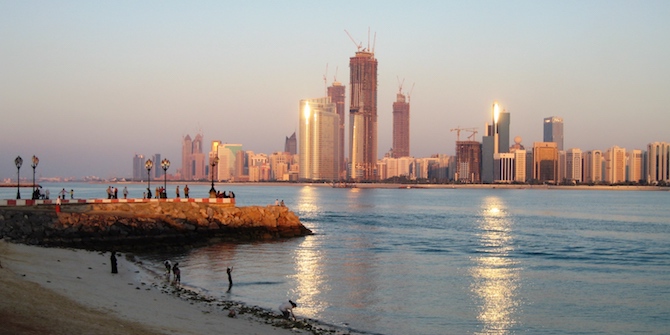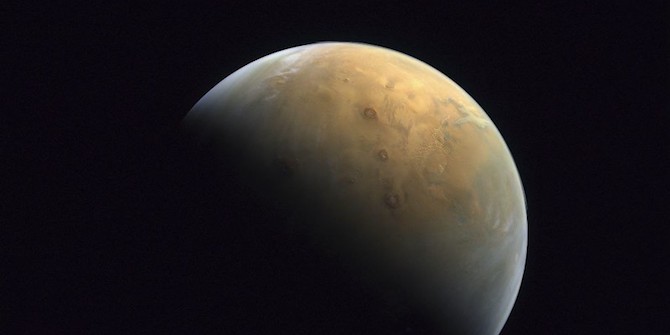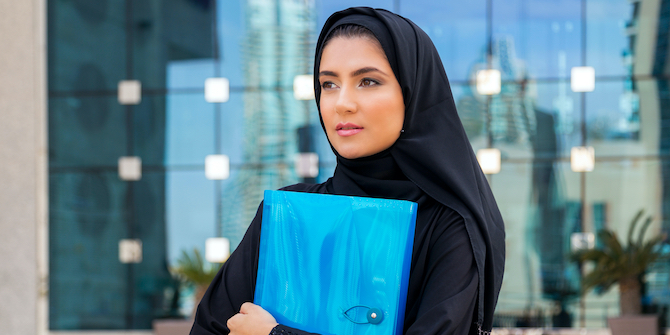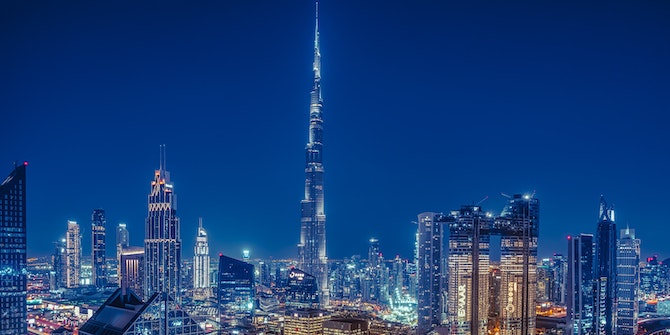by Rima Sabban
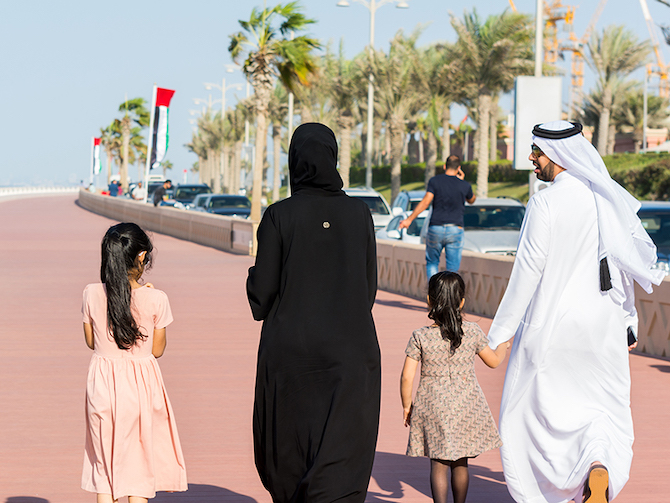
This blog examines how the Emirati state invests in its women and mothers as part of its development. The state is establishing its soft power on a variety of issues connected to women and giving them a driving seat; at times of war this mostly focuses on mothers of martyrs. The argument and study show – based on field work and multiple media used – that while the majority of UAE women approve of such staging, not all of them do.
The UAE has seen major progress in women’s status, ranking first among the GCC nations in the Social Progress Index. The first UAE Gender Council was established in 2015 and women are set to hold 50 percent of the Federal National Council’s seats.
The state uses and mobilises motherhood to secure national interests, often acting as an extension of the modern nation state system. In more other previously modern social settings women gained more agency at war and have relative impacts on their family structures and lived experiences while the value of patriotism is reinforced through supporting women’s citizenship and welfare (‘patriotic motherhood’). The state frames and constructs the identity of motherhood, often leading to other categorisations of mothers (‘nationalist mothers’, ‘mother of the martyrs’, etc), and links motherhood and national service along with the broader social welfare system to secure national interests.
Theoretically speaking, military service is an extension of the modern nation-state system – an ‘obligation’ of citizenship and nationality, the highest form of service to the nation. George Washington, the first US president, described military service as ‘a primary position, and the basis of our system, that every Citizen who enjoys the protection of a free Government, owes not only a proportion of his property, but even his personal services to the defense of it’. In the UK, mothering men who go to war was seen as ‘the most important job in the world’ through creating those who defend ‘the honour and traditions not only of our Empire but the whole civilized world’. The UAE, in turn, is at the moment of asserting its being as a nation-state, and the very creation of the national service is an indication in this direction. In 2014, the UAE led the Gulf countries in enforcing mandatory national service upon men aged 18–30 years, with voluntary service for women.
This move has profound gender implications, particularly for mothers. The pressure exerted on mothers has been clear during times of war, as it is for mothers in Europe, the US and beyond. Emirati mothers are given the role as providers/producers (of humans) and ultimately may be asked to offer their sons as a human sacrifice for the nation. This role, for which they are being prepared, is new and not one they would have imagined before. In a way, UAE mothers who ‘birthed’ their sons without thinking about wars, or considering that the sons would one day become soldiers, are now themselves ‘re-birthed’ by the rising UAE nation-state as ‘mothers of servicemen to the nation’ or ‘mothers of martyrs’. Mothers are now being retrained into this new role, parallel with other changes in the nation.
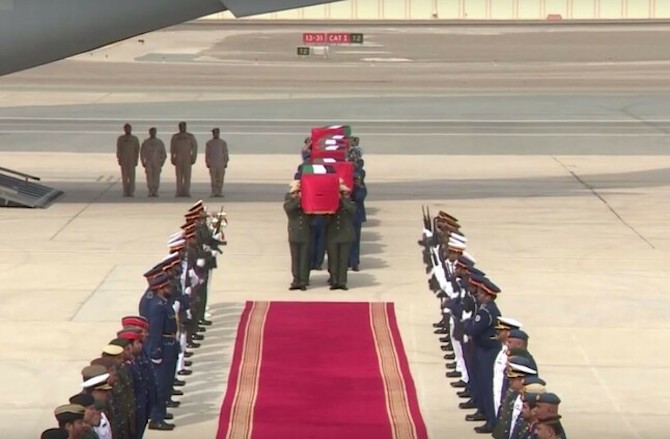
The UAE’s government today is campaigning for the public to accept the concept of martyrdom. The image above shows the arrival of six martyred servicemen in Abu Dhabi, who died in the course of performing their national duty in Yemen. The scene resembles American military ceremonies and reflects the deliberate normalisation of martyrdom in Emirati culture, taking the lead on this from other militarily powerful states. To build this consensus in the popular imagination the use of media, images and sound are effective tools.
Mothers are viewed as ‘sacred’ and ‘tools for nation building’ – essential for the country’s long-term socioeconomic development process. The implications for the Emirati state and its mothers are many. Women are viewed as a vital instrument in national and foreign policy strategies to assert a nation’s global image and sovereignty. This is a reflection of the state’s strategic social control within its territory. The strategy serves to counter the traditional patriarchal, male-dominated society; while also reflecting the state’s long-term commitment to modernisation in the cultural, religious and political spheres.
The Emirati state has been gradually incorporating the concepts of motherhood and martyrdom into its national narrative, which is trusted and accepted among most mothers so far. The question remains: is the state creating a new kind of mother through ‘re-birthing’ their new social manifestation? Or will mothers assert their agency and become actors in the social and political construction of society? Will they contest aspects of being molded as instruments of historical sacrifice?
This is part of a series emerging from a workshop on ‘Heritage and National Identity Construction in the Gulf’ held at LSE on 5–6 December 2019. Read the introduction here, and see the other pieces below.
In this series:
- Heritage and National Identity Construction in the Gulf: Between State-building and Grassroots Initiatives by Courtney Freer
- Souvenir Sovereignty in Qatar by Suzi Mirgani
- Examining Kuwait National Museum by Sundus Alrashid
- Urban Planning and Legacy Making in Kuwait by Alexandra Gomes
- Museums as Political Institutions of National Identity Reproduction: Are Gulf States an Exception? by İdil Akıncı
- The New Populist Nationalism in Saudi Arabia: Imagined Utopia by Royal Decree by Madawi Al-Rasheed
- Heritage and Sectarianism in Bahrain by Thomas Fibiger
- Dubai Expo 2020 and Ancient Mercantile Heritage by Robert Mogielnicki
- Managing UNESCO World Heritage Sites in Saudi Arabia: Contribution and Future Directions by Abdulelah Al-Tokhais
- Finding Mariam: the Invisible Woman in National Heritage Mythology by Alanoud Al-Sharekh
- Cultural Attendance: Attracting the Crowds to Museums in Saudi Arabia by Maha al-Senan
- Religion and Heritage in the Gulf: Significant in its Absence? by Courtney Freer
- Historical Archaeology in the Gulf by Robert Carter
- Militarised Nationalism in the Gulf Monarchies: Crafting the Heritage of Tomorrow by Eleonora Ardemagni
- The Practice of Heritage in the Northern United Arab Emirates by Matthew MacLean
- Displaying the Nation in Museum Exhibitions in Qatar by Alexandra Bounia
- Implicit and Explicit Cultural Policies in Qatar: Contemporary Art Production and Censorship by Serena Iervolino



